Study Abroad is for Diabetics Too! A Guide to Preparing to Go Abroad with Diabetes
One of my first thoughts after being accepted to study abroad was not about the excitement of my experience or what I wanted to pack; it was how I was going to be able to get all my medication and manage my diabetes while I was away. This is the reality of living with a chronic illness; always having to think steps ahead for the sake of your health. Even though I have been a Type One Diabetic for over ten years, I still had a lot of anxiety about traveling abroad for a long period of time. I felt like I would have no safety net if things went wrong and I couldn’t find a lot about how to go about the preparation process to be able to put that safety net in place. Now that I have been abroad and gone through getting ready for my time here, I thought it was important to share my insight into how I set myself up to balance my health and have the best experience possible.
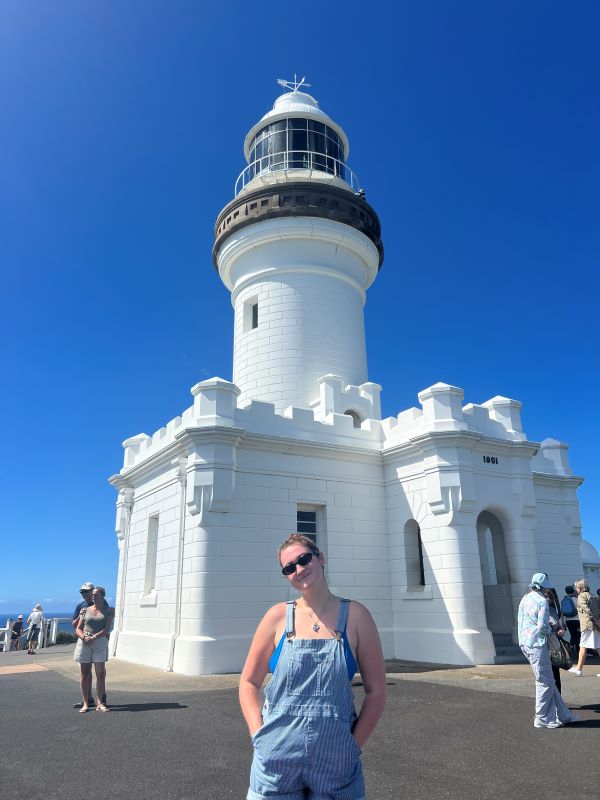
Me in front of the Cape Byron Lighthouse.
Documents and Doctors, Oh My!
In terms of important documents needed, I received a letter from my doctor that outlined all of my medication and the fact that I was a diagnosed diabetic. This travel note helps to explain everything in case there are any questions or confusion at customs or at security checkpoints. When I asked my doctor for the travel note, we also discussed my time abroad and how to best be successful while abroad, which was helpful to get her advice and insight.
Another document that may or may not be expected of you (depending on your country’s location) is a medical exam and medical approval along with your visa to be able to go. For my Australian tourist visa, this meant I had to see a consulate-approved doctor and get an examination before my visa could be approved. If your destination country doesn’t require a medical examination, I encourage you to still check in with your doctor to make sure everything’s set before going abroad. Though the actual appointment was brief, the process of getting an appointment took some time and was an additional cost, so check with the country’s consulate website and with CEA CAPA staff for specific requirements for your country if this is something that is required for you. Once my examination was sent in, it only took around two weeks for my visa to be approved and for me to be ready to go!
Phone Calls Are Your Best Friend
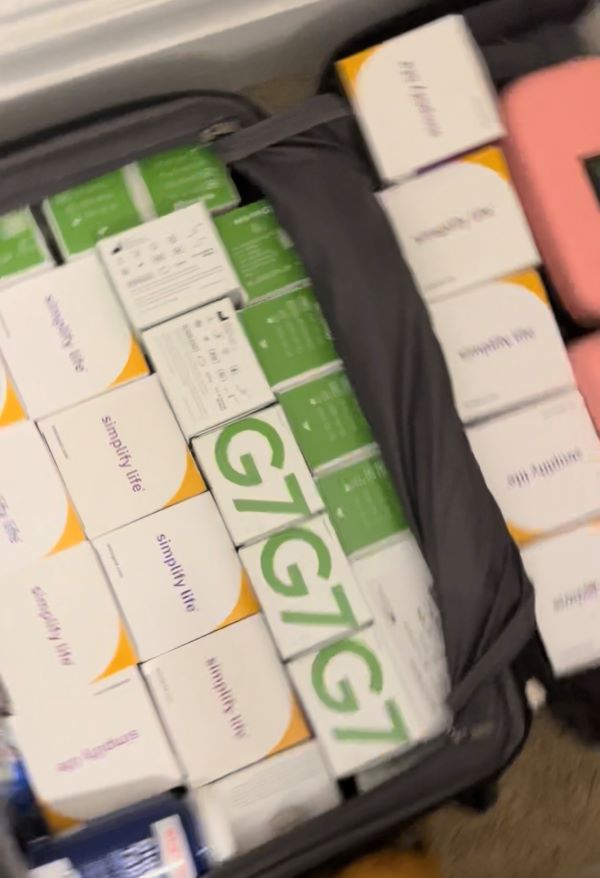
A photo of all my diabetes medication in the suitcase of my carry-on.
If you also have a chronic illness or diabetes, you are no stranger to insurance companies and long phone calls with doctors, and your preparation to go abroad will be no different. My main piece of advice is to stay persistent and continue to advocate for yourself when talking to your insurance and your pharmacy and explain to them that you are studying abroad. This is not meant to deter you but acts as a warning about the duration of time it will take to get the amount of medication you will need for your semester.
The way insurance works is different for everyone, but in my experience, to get the amount of insulin, insulin pumps, and continuous glucose monitors that I needed to go abroad, I had to get a vacation override from my insurance company which was then sent to the pharmacy or medical supply distributor then was sent to me. I started this process about one and half months before my departure date and just was able to get all my medication in time. The first step is consulting with your doctor and making sure your prescription is up to date and then contacting your insurance company. I was able to receive and bring a six-month supply for my four-month study abroad semester, especially as my doctor advised me to bring and get extra supplies in case anything happened.
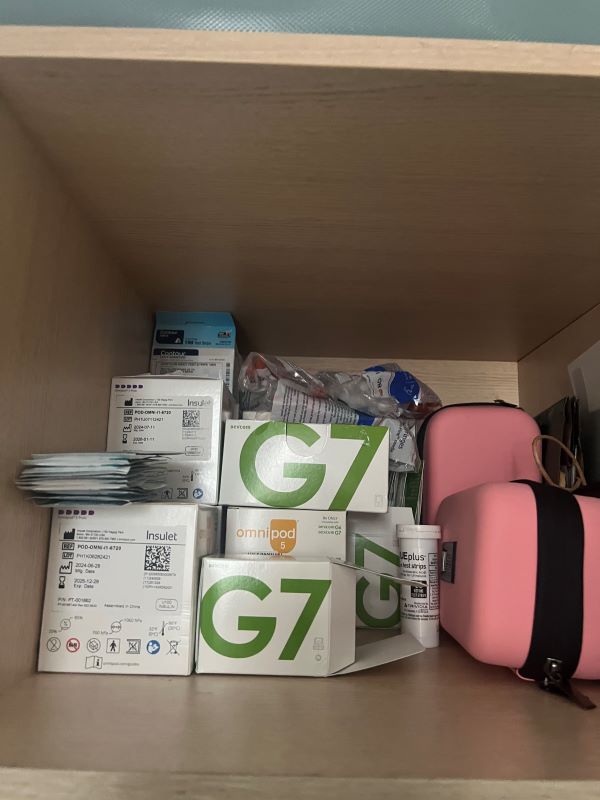
My medication is stored in my apartment in Sydney, including the insulin carriers I use.
Traveling with insulin is also always stressful since it must be refrigerated and was something I was nervous about, especially since the flight to Australia is so long. One of my diabetic friends, who had also recently studied abroad, recommended buying insulin carriers on Amazon that have the temperature on the outside and have ice packs that you can freeze and take through security. These worked well for me and my journey and have also been helpful when traveling elsewhere during my program. I had to buy four to be able to fit all of them for the journey to Sydney. Another tip is to contact the airline you are flying to ensure that you can bring this in a carry-on bag, and this, in most cases, can be done for no additional charge if it is just medical supplies in the bag. Again, this will take some phone calls and a lot of self-advocacy, even at the airport with airline staff, but will be worth it for the peace of mind of having what you need with you at all times.
Sweetness of Support
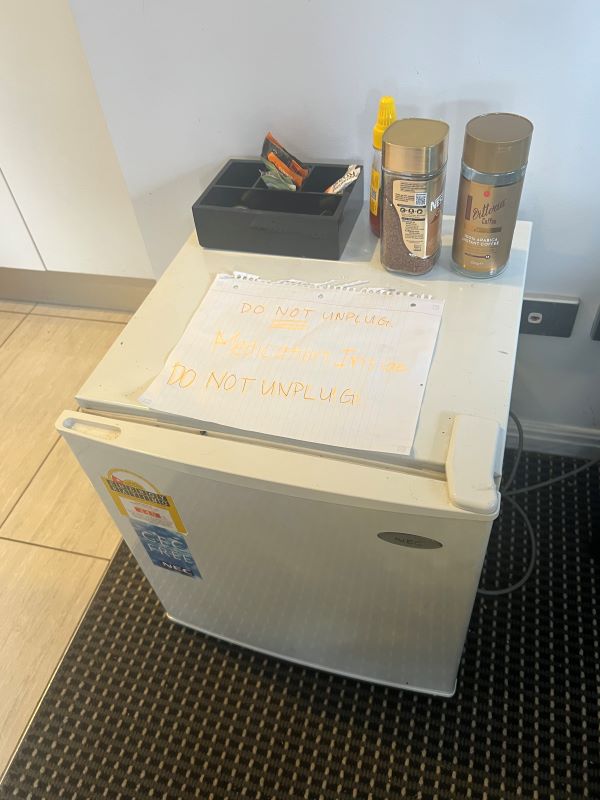
A picture of my mini fridge in my apartment
Beyond just getting to Australia with all my medication and documents, I wanted to know that I would be supported during my internship and study abroad semester. The CEA CAPA Health and Safety staff were my biggest advocates and were so helpful in getting my accommodations from my home institution to my time abroad. To store all my insulin, they helped get me a mini fridge in addition to our large fridge that I put it all in and so I didn’t have to worry about taking up space in the communal area. They also handled getting my in-class accommodations, like access to my phone, food, water, and all my professors. Receiving that support helped me feel settled and less anxious when I got here knowing that someone else was also advocating for me.
Although the process of self-advocating and going through lots of phone calls was a lot of work, I cannot overstate how it has all been worth it to be here in Sydney. It took some adjusting to my new schedule and eating habits to get my blood sugar numbers under control and I’ve had to use more overlay patches to keep my insulin pumps on from being in the water more but I’ve been able to continue about my life and fully enjoy my study abroad experience. I cannot believe my anxiety almost held me back from what has been the best experience of my life. My perseverance made this experience even more worthwhile and it can be the same for you too!
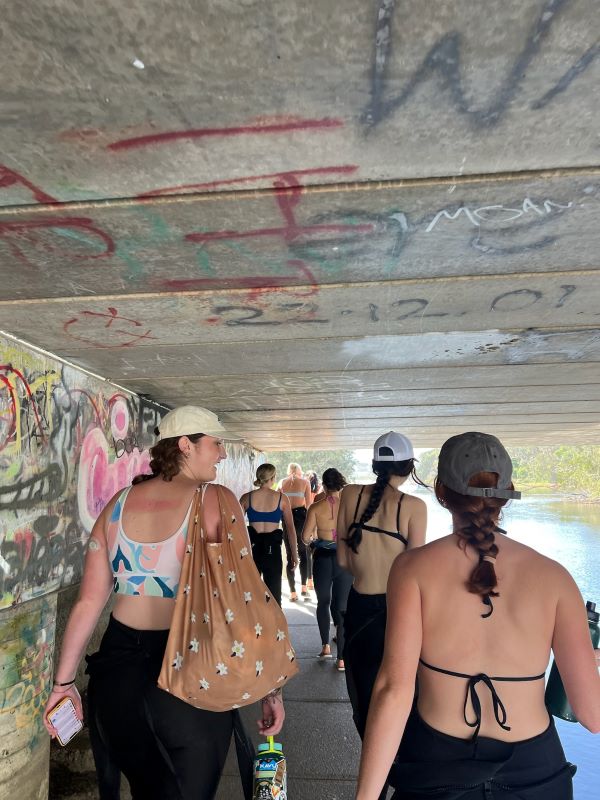
Me and my roommates walking to surf camp. Peep the Dexcom loud and proud on my left arm!
If you plan on studying abroad with CEA CAPA soon and will be managing a similar health concern, please reach out to the Health and Safety Team at healthandsafety@ceacapa.com. You may also reach out to accommodations@ceacapa.com to request housing and academic accommodations. We highly recommend students do this as early as possible to set themselves up for success!











